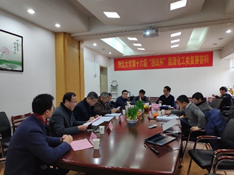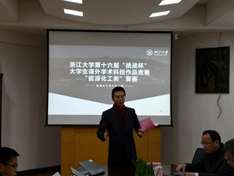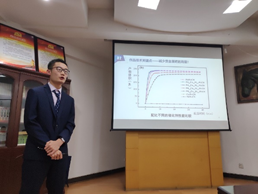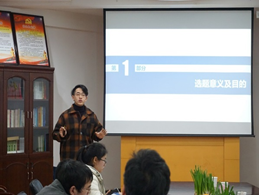Challenge Cup college’s students extracurricular academic and scientific works competition is a directory, exemplary and massive competition, held by Communist Youth League Central Committee, China Association for Science and Technology, Ministry of Education, National Association of Students. It is held every two years, named scientific and innovative Olympics competition of college students. On the afternoon of Jan. 11th, 2019, Challenge Cup college’s students extracurricular academic and scientific works competition, the the Energy and Chemical Engineering Finals of Zhejiang University was held in Chao Kuang Piu Building, Yuquan Campus.
19 teams from energy, chemical engineering, materials and polymer schools entered the finals. Prof. Yijian He, Prof. Shaozhi Zhang from the School of Energy, Prof. Zhongjian Li, Prof. Min Ling of the School of Chemical Engineering, Prof. Tiejun Zhu, Prof. Kui Cheng of the School of Materials and Prof. Qi Wang, Prof. Changzhi Li of the School of Polymers served as the judeges.


The finals defense is divided into a 7-minute team presentation and a 3-minute free question-and-answer session. The judges and teachers will score on the live performance and the status of the declaration. The top 10 teams with the highest average score will be recommended to participate in the school-level finals. Zhu Rongheng, deputy secretary of the Youth League Committee, Zhang Shiliang, deputy secretary of the Party Committee of the School of Materials, and Zhu Hang, deputy secretary of the Materials Committee, also presented in the match.
Before the finals defense, Hengkui Zhuo conveyed the goal of the Challenge Cup and hoped to select outstanding works with potential to participate in the school competition. Shiliang Zhang introduced the judging rules and scoring notes to the judges.


Based on the Tesla valve principle, the Leyun Feng team of the School of Energy has studied a new type of wind instrument, which has several branches, and the fluid flows through different branches and different lengths, opening at different branches and different lengths, so that the wind instrument can produce more various tones. The Haosheng Li team of the School of Materials has innovatively proposed the idea of a sleeve-type flexible porous piezoresistive sensor in the context of the current surgical treatment of the ureteral injury, which is limited to the empirical judgment of the surgical staff and the lack of professional and accurate testing equipment. The Junhui Cao team from the School of Chemical Engineering prepared an ultrathin ZIF-67 coated ZIF-67/Co(OH)2 core-shell composite catalyst by electrochemical deposition and gas phase reaction based on the purpose of finding an anode catalyst suitable for electrolyzed water. The Yanchen Chen team from the polymer school has serious problems of scaling and bacterial growth in the water supply pipeline system. The two antibacterial and anti-adsorption materials are copolymerized or blended, designed and prepared anti-adsorption material.



